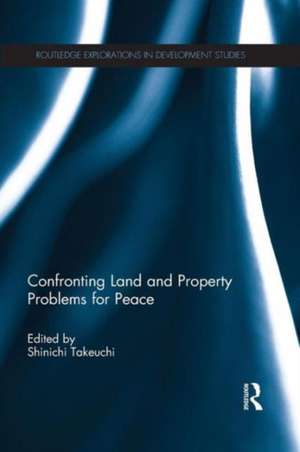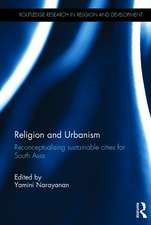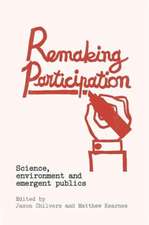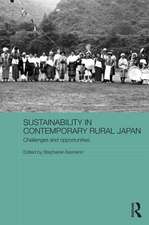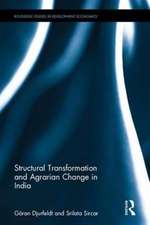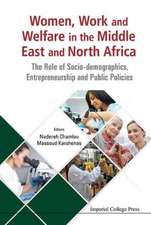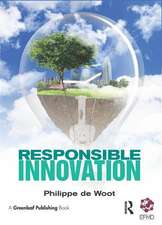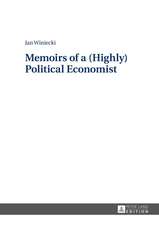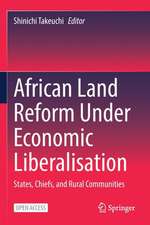Confronting Land and Property Problems for Peace: Routledge Explorations in Development Studies
Editat de Shinichi Takeuchien Limba Engleză Paperback – 21 dec 2015
In contrast to previous literature, this volume analyses land and property problems in conflict-afflicted areas from a long-term perspective of state-building and economic development, rather than concentrating only on the immediate aftermath of the conflict. The long-term perspective enables not only an understanding of the root causes of the property problems in conflict-affected countries, but also elaboration of effective policy measures for peace. Contributors are area specialists and the eight case study countries have been carefully selected for comparative study. The collection applies a common framework to a diverse group of countries – South Sudan, Uganda, Rwanda, Burundi, Cambodia, Timor-Leste, Colombia, and Bosnia-Herzegovina.
| Toate formatele și edițiile | Preț | Express |
|---|---|---|
| Paperback (1) | 284.52 lei 6-8 săpt. | |
| Taylor & Francis – 21 dec 2015 | 284.52 lei 6-8 săpt. | |
| Hardback (1) | 737.63 lei 6-8 săpt. | |
| Taylor & Francis – 27 mai 2014 | 737.63 lei 6-8 săpt. |
Din seria Routledge Explorations in Development Studies
- 8%
 Preț: 389.79 lei
Preț: 389.79 lei -
 Preț: 310.45 lei
Preț: 310.45 lei -
 Preț: 325.72 lei
Preț: 325.72 lei -
 Preț: 325.72 lei
Preț: 325.72 lei -
 Preț: 152.55 lei
Preț: 152.55 lei -
 Preț: 155.43 lei
Preț: 155.43 lei -
 Preț: 311.41 lei
Preț: 311.41 lei - 8%
 Preț: 388.91 lei
Preț: 388.91 lei -
 Preț: 326.96 lei
Preț: 326.96 lei -
 Preț: 311.41 lei
Preț: 311.41 lei -
 Preț: 282.46 lei
Preț: 282.46 lei -
 Preț: 324.67 lei
Preț: 324.67 lei -
 Preț: 489.26 lei
Preț: 489.26 lei -
 Preț: 485.40 lei
Preț: 485.40 lei -
 Preț: 416.22 lei
Preț: 416.22 lei -
 Preț: 389.38 lei
Preț: 389.38 lei - 28%
 Preț: 821.06 lei
Preț: 821.06 lei -
 Preț: 389.38 lei
Preț: 389.38 lei - 18%
 Preț: 1000.27 lei
Preț: 1000.27 lei - 18%
 Preț: 998.71 lei
Preț: 998.71 lei - 26%
 Preț: 848.96 lei
Preț: 848.96 lei - 18%
 Preț: 1000.27 lei
Preț: 1000.27 lei - 18%
 Preț: 999.61 lei
Preț: 999.61 lei - 12%
 Preț: 299.87 lei
Preț: 299.87 lei -
 Preț: 299.52 lei
Preț: 299.52 lei -
 Preț: 411.42 lei
Preț: 411.42 lei - 13%
 Preț: 297.99 lei
Preț: 297.99 lei - 18%
 Preț: 1057.05 lei
Preț: 1057.05 lei - 18%
 Preț: 1060.25 lei
Preț: 1060.25 lei - 18%
 Preț: 1170.84 lei
Preț: 1170.84 lei - 18%
 Preț: 1000.27 lei
Preț: 1000.27 lei - 25%
 Preț: 544.50 lei
Preț: 544.50 lei - 31%
 Preț: 765.01 lei
Preț: 765.01 lei - 25%
 Preț: 851.46 lei
Preț: 851.46 lei - 18%
 Preț: 1000.27 lei
Preț: 1000.27 lei - 25%
 Preț: 767.38 lei
Preț: 767.38 lei - 26%
 Preț: 763.78 lei
Preț: 763.78 lei - 12%
 Preț: 301.33 lei
Preț: 301.33 lei - 18%
 Preț: 1110.74 lei
Preț: 1110.74 lei -
 Preț: 485.07 lei
Preț: 485.07 lei
Preț: 284.52 lei
Nou
Puncte Express: 427
Preț estimativ în valută:
54.44€ • 56.99$ • 45.31£
54.44€ • 56.99$ • 45.31£
Carte tipărită la comandă
Livrare economică 31 martie-14 aprilie
Preluare comenzi: 021 569.72.76
Specificații
ISBN-13: 9781138646445
ISBN-10: 113864644X
Pagini: 308
Dimensiuni: 156 x 234 x 16 mm
Greutate: 0.45 kg
Ediția:1
Editura: Taylor & Francis
Colecția Routledge
Seria Routledge Explorations in Development Studies
Locul publicării:Oxford, United Kingdom
ISBN-10: 113864644X
Pagini: 308
Dimensiuni: 156 x 234 x 16 mm
Greutate: 0.45 kg
Ediția:1
Editura: Taylor & Francis
Colecția Routledge
Seria Routledge Explorations in Development Studies
Locul publicării:Oxford, United Kingdom
Public țintă
PostgraduateCuprins
1. Introduction: land and property problems in peacebuilding 2. The land question, internal conflicts and international statebuilding in South Sudan 3. Land disputes in the Acholi sub-region in Uganda: from displacement to dispossession 4. Land tenure security in post-conflict Rwanda 5. Dealing with land problems in post-conflict Burundi 6. Property rights in the statebuilding of Bosnia and Herzegovina 7. Colombian land problems, armed conflict and the state 8. Land problems in Cambodia: the historical influence of conflict 9. Land, state and community reconstruction: Timor-Leste in search of a sustainable peace 10. Conclusion: confronting land and property problems for peace
Notă biografică
Shinichi Takeuchi is a visiting fellow at the JICA Research Institute and Director of the African Studies Group at the IDE–JETRO (Institute of Developing Economies – Japan External Trade Organization). He has a PhD from the University of Tokyo. Having specialised in the political economy of Central African countries, his current interest lies in the processes of statebuilding and peacebuilding in the area with particular focus on land problems.
Descriere
In contrast to previous literature, this volume analyses land and property problems in conflict-afflicted areas from a long-term perspective of state-building and economic development, rather than concentrating only on the immediate aftermath of the conflict.
